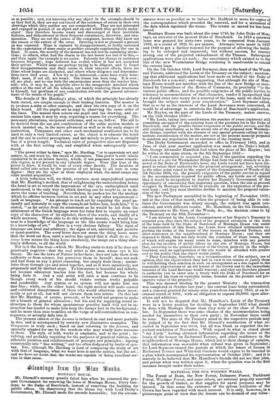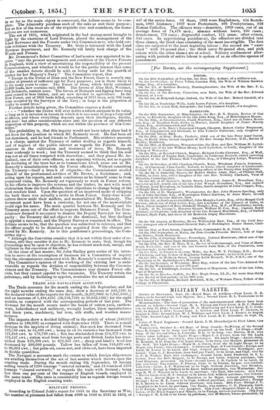MATERIAL FQR OUR WOODEN WALLS.
The Forest of Dean, the New Forest, Delamere Forest, Parkhurst Forest, Woolmer Forest, and some others, are national property reserved for the growth of timber, so that supplies for naval purposes- may be insured. In that sense the existence of the sylvan territories of the Crown has been regarded with much interest. It is only, however, in a picturesque point of view that the forests can be deemed of any value :
in so far as the main object is concerned, the failure seems to be com- plete. The Admiralty purchase such of the oaks as suit their purpose ; but as few of the trees are of the requisite size and soundness, the trans- actions are not numerous.
The act of 1851, which originated in the bad management brought to light by the exertions of Lord Duncan, placed the management of the Land Revenues and the Forests under two Commissioners, who hold cer- tain relations with the Treasury. Mr. Gore is intrusted with the Land Revenue department, and Mr. Kennedy till lately took charge of the Woods and. Forests.
Mr. Drummonti's Select Committee of last'session was appointed to in- quire "into the present management and condition of the Crown Forests in England, with a view of ascertaining the responsibility of the present Commissioners, and whether it would be for the public interest that some of the smaller forests should be sold, as being unfit for the growth of timber for her Majesty's Navy." The Committee report, that
" Except in the Forest of Dean and the New Forest, there is scarcely any timber at present of sufficient age for Navy purposes; nor is there likely to be for many years to come. The Forest of Dean, which lately contained 22,000 loads, now contains only 4000. The forests of Alice bolt, Woolmer, and Delamere, contain none. The forests of llainault and Epping have long since ceased to bear timber, and are now devoted to agriculture. In the New Forest, out of 2635 loads felled, consisting of 3115 trees, only 936 loads were accepted by the Surveyor of the Navy ; so large is the proportion of faulty to sound trees."
Further details being given, the Committee express a doubt
- - " whether the Crown will ever derive a return adequate to its value, so long as it is invested in forests in which it is necessary to keep a large staff of officers, and where everything depends upon their intelligence, fidelity, and seal : but other considerations enter into the question of any different disposition of this property, which are not within the province of this Com- mittee."
The probability is, that this inquiry would not have taken place had it not been for the position in which Mr. Kennedy stood. He had been all but dismissed, and he bad Mends in Parliament. His evidence amounts to a charge against the Treasury of unfair dealing as regards himself, and of neglect of the public interest as regards the Forests. As an amateur in the cultivation and treatment of trees, Mr. Kennedy went zealously to work ; but the Treasury seemed to think that his zeal WAS not at all times tempered with discretion ; and they placed Mr. Ar- buthnot, one of their own officers, as an opposing witness, not as regards the doctoring of the trees but as to transactions which arose out of Mr. Kennedy's dissatisfaction with the Forest officials. Without consulting the Treasury—itself a breath of etiquette—the Commissioner availed himself of the professional services of Mr. Brown, a Scotchman; and, acting upon his reports, and such conclusions as he himself came to from occasional visits, Mr. Kennedy set vigorously to work in Forest reform. In his efforts to improve the revenue and the timber, he met with much obstruction from the local officials, their objections to change being of the moat resolute kind. Upon the question of an improved mode of stripping the bark there was actually a strike in Dean Forest. Sixty-four wood- cutters threw aside their mallets, and memorialized Mr. Kennedy. The document must have been a curiosity, for not one of the memorialists could sign his name. The main quarrel between Mr. Kennedy and the Treasury arose out of the effort to improve Delamcre Forest. The Com- missioner deemed it necessary to dismiss the Deputy Surveyor for inca- pacity : the Treasury did not object to the dismissal, but they declined to appoint a successor, and the Deputy Surveyor remained in office. The defence seems to be, that the question was submitted to referees, and that the officer sought to be dismissed was acquitted from the charges pre- ferred by Mr. Kennedy. As to this gentleman's proceedings, the Com- mittee say-
" Although the Committee consider that it is not within their order of re- ference, still they consider it due to Mr. Kennedy to state, that, though his proceedings may be open to objection, he has eviuced much zeal, energy, and vigilance in the execution of his office."
At the close of last session, Sir John Shelley gave notice of his inten- tion to move at the resumption of business for a Committee of inquiry into the circumstances connected with Mr. Kennedy's removal from office. The Committee's opinion of the working of the existing law is unfa- vourable as regards the division of responsibility between the Commis- sioners and the Treasury. The Commissioners may dismiss Forest offi- cials, but they cannot appoint to the vacancies. The Treasury retain the patronage, and by declining to appoint, neutralize the act of dismissal.



































 Previous page
Previous page